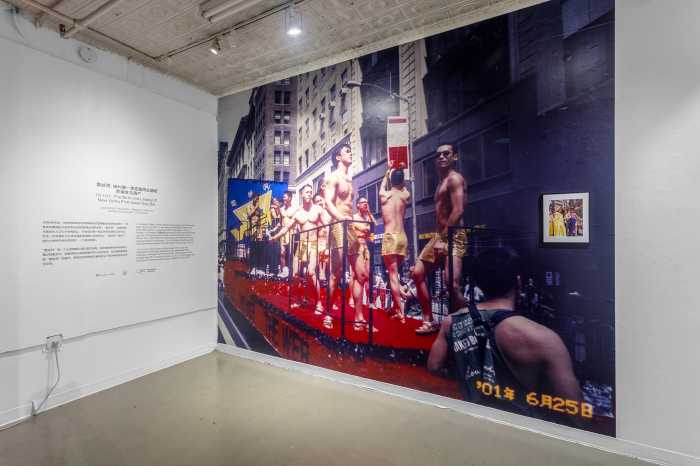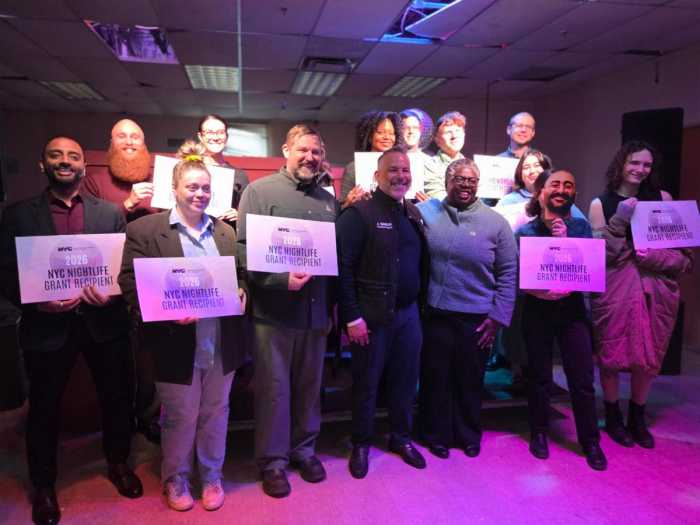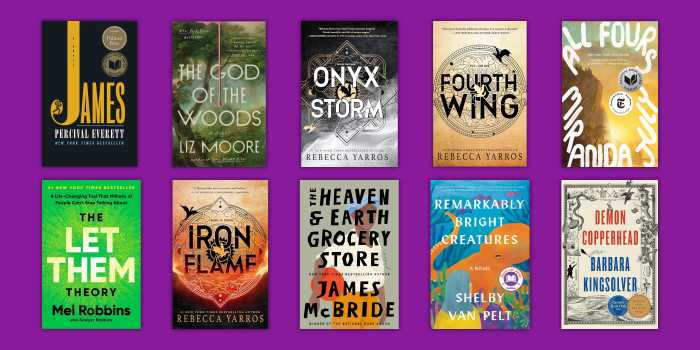IN THE NOH: The New York Times officially initiated its Film Club on December 2, with a red carpet screening of Sonia Nassery Cole's “The Black Tulip,” a powerful drama of one Afghan family's struggle against the Taliban.
The film was followed by a performance by its associate producer, Natalie Cole, who, sparkling in silver KaufmanFranco, brought her refulgent vocals to “Smile,” “Unforgettable,” and two songs featured in the movie.
She told me, “Sonia [no relation] and I have known each other for many years, and when she started the Afghanistan World Foundation, I joined the board. Two years ago she gave me this script and we kept going over it, tightening it up. I ended up meeting her music composer, Chris Young, and making some additions to 'The Freedom Song,' and 'Forever One Love' right there at Capitol Records.”
Natalie's activism, Legere's legends, Brinberg's Barbra, Teutonic divas, Bertolucci's eroticism
Political activism is new for Cole: “It's pretty much an anti-Taliban film. Sonia's on a mission and I get it, so we're hoping the world gets a chance to see it. No other film has been made like it, certainly not by a woman, and they haven't allowed a film to be made in Afghanistan in over 30 years, so there's a lot of history-making going on. It wasn't a big budget and it was scary working on the film amidst bombs and soldiers. Everyone really sacrificed to make this film.
“Afghan women are very fierce and determined, not little wusses at all. The burka is cool, in a way. These days it's not used as a form of shame, but for privacy, moving through the streets and not being bothered. I wore a scarf the whole time I was there whenever we stepped outside, but I liked that.
“Musically, there won't be a new CD from me any time soon. I'm so busy doing some other stuff right now, but think I'll start writing in January for a new record. My book came out two weeks ago, about the journey of my health and the miracle that happened with it. There's a song that they're remixing as we speak that's also the title of the book, 'Love Brought Me Back.'”
Another definite music survivor is Phoebe Legere, who is playing with her quintet at Iridium on December 21 (1650 Broadway at 51st St., 8-10 p.m.; iridiumjazzclub.com). Although much younger, Native American, Vassar-educated Legere is like the Cher of the downtown New York music scene — cockroach-indestructible and retaining the sexiness and exquisite bombshell looks we've known from the 1980s. I shared champers and chatter with her at her charming Loisada studio, and she told me, “My show is going to be the usual mix of sexual/ political commentary couched in fun, feathers, glitter, happiness, and joy. It will be totally mixed-media new in that there will be screens onstage and I'll show my paintings, clearly rooted in queer theory and aesthetics.
“Cabaret has to grow up — it's become a very elitist art form, way too expensive and too much in the past, like a museum. I will always sing songs from the Great American Songbook, but to these I add my own compositions, which will always be my commentary on how we are living now. That's what songs are supposed to do – make sense out of a very chaotic, violent, weird world.”
An out lesbian, Legere cites the influence of three major male mentors — “Eloise” illustrator Hilary Knight, painter Larry Rivers, and writer Hunter S. Thompson.
“Larry and I were introduced formally at the home of Cornelius Conboy, who ran the club 8BC,” she said. “His lover was poet John Ashbery, the ex-lover of Frank O'Hara. I was much more interested in John than Larry because of his fantastic Proustian mind. Larry was in black leather pants, and I thought he was kind of corny. But he pursued me like mad and finally came to hear me play the piano at the gay restaurant Company.
“I was wearing a beautiful vintage rhinestone bracelet, and Larry said, 'I want to buy that.' I said, 'Fine. I want a thousand dollars.' He pulled the money out of his pocket and put the bracelet on and sat around preening, and I thought, 'This guy is really too gay!'
“He finally said, 'What do you want? I will give you anything.' If I'd had any brains I would have said a building on the Lower East Side, but I didn't, and said I wanted a record contract and within 24 hours I was signed to Epic Records. Matt Weiss was the president, and he was that strange kind of woman-hating gay man who once said, 'I would rather be lowered into a pit of snakes than be with a woman.'
“So the chemistry was not there, especially when I refused to change the same-sex kiss lyric in my song about Marilyn Monroe. But I remained friends with Larry. He came over two weeks before his death and tried to fuck me.
“I wasn't sure who Hunter Thompson was at first – not really my era and hadn't read his books. But a mutual friend brought me into his kitchen in the Rockies and Hunter was there, doing cocaine. The reason I was brought there was because Hunter had kind of lost his inspiration, couldn't get an erection anymore — coke dick — and he wasn't writing. They thought I would kick start the whole thing, but the minute we met, I knew he was a kindred spirit.
“Here's a painting of Hunter holding a gun to my heart, which has no safety on it. He later shot — a superficial flesh wound — his housekeeper, Deborah, and I believe the gunplay was all about sexual frustration, not being able to ejaculate.
“But of course he was perfect for me, so I moved in with him. He was a great cuddler and found the most fabulous lesbian pornography and we'd sit and watch it, and he'd say, 'You really like that, don't you?' He really understood who I was and taught me a lot about writing.”
One Legere painting, “Matt Dillon,” is a graphic depiction of sex with the then young star: “After the debacle with Epic, I had $26 in the bank, and the club Limelight asked me to play there. One month before, Epic had said they were going to turn me into a combination of Streisand and Madonna, and then there I was, playing this shithole. Freddie, the VIP lounge host, said, 'Why don't you hang out with these stars?' Matt and I ended up going on several dates; he was definitely too dumb for me, but a large and beautifully formed cock which I could appreciate – fat – and here I tried to get his exact shade of pink.”
I told Legere that my favorite color in the world was cockhead pink, prompting her to cry, “We should make a whole line of men's clothes in Cockhead Pink, velvets!”
Being ripped off by the likes of Madonna and Gaga is something Legere takes in her stride, and she doesn't begrudge today's youth: “Though it's still hard, these queer kids didn't come up with quite the chip I had on my shoulder. If you knew the hell that I and my bass player and lover, Susan Rakowksi, went through as out gay women in the early 1980s, ostracized as lepers when people discovered they couldn't sleep with us. Hundreds of painful stories as feminists with no support structure.
“Gene Simmons of Kiss tried to help us out by sending us to his manager, Howard Marks. Marks knew we were gay, 17-year-old virgins, and said, 'I want to sleep with Susie.' I went ballistic. First of all, this is my girlfriend, and he wants me to allow him to violate her, take her virginity, to prove his power over these two little gay girls? I was sexually harassed constantly, but this hurt more, him expecting me to say, 'I want to be a star, go ahead, have my girlfriend.' I grabbed her and walked out, and I supposed at that moment my career was over, no matter what I did.
“So I really love these young gay girls being able to walk down the street, holding hands, these gay guys of color, so out there and so beautiful, this whole new gay young culture.”
Someone who just went ahead and became Streisand, without a record contract, is Steven Brinberg, who has been performing as this most exalted of divas all over the world since the early 1990s, and will be at Don't Tell Mama on December 18 (343 W. 46th St., 8:30 p.m.; dontellmamanyc.com) and Metropolitan Room on January 8 (34 W. 22nd St., 9:30 p.m.; metropolitanroom.com).
Brinberg's voice, uncannily similar to Streisand's, has been praised by such hard-to-please souls as Arthur Laurents – who told him, “This is like Barbra if she went into a funhouse and looked in a mirror. You should have a show of your own!” — and Stephen Sondheim, who saw him at Mama's.
Brinberg said, “He wrote me a fan letter, and I was hired to sing at his 70th birthday celebration at the Library of Congress. People then thought it maybe wasn't a good idea, and he told me, 'There was a series of little resistances to you, not one big one, but I put my foot down and you're in it.'
“Once I wanted to sing 'In Buddy's Eyes,' but with a lyric change which I knew would have to be approved, so I called him and asked, and he said, 'Just write down the words and send them to me.' The lyric was 'I'm still the princess, Princess of Tides,' but he said, '”I'm still the princess, to the Prince of Tides” would be funnier and make more sense lyrically. But try it out.' I did it both ways, and told him mine got a bigger laugh, so he said, 'That's fine.'”
Brinberg has never actually met Streisand, “but nearly everybody else – her sister, Donna Karan for whom I performed, as I have with Marvin Hamlisch, who tried to get me hired for her concert. She definitely knows who I am now, and I'm not really afraid of meeting her and being disappointed. If she ever came to see me, I'd either freeze, which I don't think so, or give the performance of my life.
“Liza Minnelli was sitting right next to me once and loved it. If I had the chance, I wouldn't ask her about her career but about Chinese food. She worked as a cashier in a restaurant as a teenager and would know exactly what I was talking, this chow men, chicken broccoli, and American Chinese food I'm obsessed with that's now extinct. It was first generation Chinese food that went out of fashion by the 1970s when Szechuan came in. I grew up with it, and there's only one place in Queens that has it now, one on Staten Island, and two in the Bronx, where I grew up, although I'd say Riverdale if I wanted to impress anyone and the Bronx when applying for financial aid.”
Brinberg has performed everywhere from a Long Island public library with just a boom box to a Catherine Zeta Jones party. “Lauren Bacall was there, and I said, 'Hi, Mom!' [from “The Mirror Has Two Faces'] and she froze, but Joan Rivers said, 'You sound just like her, but you know that!' I don't work the crowd in drag usually afterwards, and was in the kitchen taking off my makeup when Zeta Jones walked in to have a cigarette and said, 'You are unbelievable! I want to bring you to Wales to sing for my parents!' I asked to take a picture with her and that's when she had this lawsuit with 'Hello!' magazine, and she said, 'I can't take a picture, but here…' And she opened her purse and gave me her bottle of Salvador Dali perfume, without the cap, but still. Very Joan Crawford because she knew how meaningful that would be for me.”
This winter you'll find me at MOMA for “Weimar Cinema, 1919-1933: Daydreams and Nightmares” (11 W. 53rd St., through Mar. 7; moma.org), a jaw-dropping assemblage of German film rarities, from my favorite, artistically oh-so fecund period. I once spent an entire day reveling in the Berlin Filmmuseum, and will delight in discovering the histrionic riches on display here.
The sprightly, doll-like Lilian Harvey enchanted the world in her international musical success “Congress Dances” before being brought to Hollywood for four abysmal Fox features. She later aided Nazi escapees;
Elisabeth Bergner was the most highly regarded, imitated actress of her day with her Streisand looks and whisperingly intimate, mercurial, echt-Viennese talent.
Asta Nielsen, who resembled a man in drag, turned down the offer of her own studio by Goebbels himself, aided Jews during World War II, and delivered stark performances as uncompromising as her looks.
Charming Renate Muller, in the original German 'Victor Victoria”, is perhaps the most fascinating – extremely popular, she was courted by the Nazis for propaganda films but refused, and died at 31, after a fall from a high window – a probable victim of the Gestapo, although it was ruled a suicide.
Finally, is there a more glamorous lesbian presence in all film than the sumptuous Dominique Sanda in Bernardo Bertolucci's triumphantly Deco masterpiece “The Conformist,” which is being screened both at Film Forum (209 W. Houston St., Dec. 17-23; filmforum.org) and at MOMA (11 W. 53rd St., Dec. 15, 8 p.m.; moma.org), in its Bertolucci tribute? Her seduction of Stefania Sandrelli, while prone in bed and during an unforgettable same-sex tango, represents cinema at its most deliriously erotic.
Bertolucci's oeuvre has also always evinced a most palpable, often full-frontally nude male homoeroticism: “The Conformist”'s ambivalent protagonist, Jean-Louis Trintignant, and his childhood interplay with Pierre Clementi's gay chauffeur; “1900” and its scene of the lucky whore simultaneously masturbating hunky young Robert DeNiro and Gerard Depardieu; “La Luna”'s Oedipal shock; the relentless testosterone of “Last Tango in Paris”; his adaptation of Paul Bowles' “The Sheltering Sky”; the casual nakedness of “Stealing Beauty,” and the enthralling embrace of Michael Pitt's beauty in “The Dreamers.”
Contact David Noh at Inthenoh@aol.com and check out his new blog at http://nohway.wordpress.com/.co, brought her refulgent vocals to “Smile,” “Unforgettable,” and two songs featured in the movie.
She told me, “Sonia [no relation] and I have known each other for many years, and when she started the Afghanistan World Foundation, I joined the board. Two years ago she gave me this script and we kept going over it, tightening it up. I ended up meeting her music composer, Chris Young, and making some additions to 'The Freedom Song,' and 'Forever One Love' right there at Capitol Records.”
Political activism is new for Cole: “It's pretty much an anti-Taliban film. Sonia's on a mission and I get it, so we're hoping the world gets a chance to see it. No other film has been made like it, certainly not by a woman, and they haven't allowed a film to be made in Afghanistan in over 30 years, so there's a lot of history-making going on. It wasn't a big budget and it was scary working on the film amidst bombs and soldiers. Everyone really sacrificed to make this film.
“Afghan women are very fierce and determined, not little wusses at all. The burka is cool, in a way. These days it's not used as a form of shame, but for privacy, moving through the streets and not being bothered. I wore a scarf the whole time I was there whenever we stepped outside, but I liked that.
“Musically, there won't be a new CD from me any time soon. I'm so busy doing some other stuff right now, but think I'll start writing in January for a new record. My book came out two weeks ago, about the journey of my health and the miracle that happened with it. There's a song that they're remixing as we speak that's also the title of the book, 'Love Brought Me Back.'”
Another definite music survivor is Phoebe Legere, who is playing with her quintet at Iridium on December 2 (1650 Broadway at 51st St., 8-10 p.m.; iridiumjazzclub.com). Although much younger, Native American, Vassar-educated Legere is like the Cher of the downtown New York music scene — cockroach-indestructible and retaining the sexiness and exquisite bombshell looks we've known from the 1980s. I shared champers and chatter with her at her charming Loisada studio, and she told me, “My show is going to be the usual mix of sexual/ political commentary couched in fun, feathers, glitter, happiness, and joy. It will be totally mixed-media new in that there will be screens onstage and I'll show my paintings, clearly rooted in queer theory and aesthetics.
“Cabaret has to grow up — it's become a very elitist art form, way too expensive and too much in the past, like a museum. I will always sing songs from the Great American Songbook, but to these I add my own compositions, which will always be my commentary on how we are living now. That's what songs are supposed to do – make sense out of a very chaotic, violent, weird world.”
An out lesbian, Legere cites the influence of three major male mentors — “Eloise” illustrator Hilary Knight, painter Larry Rivers, and writer Hunter S. Thompson.
“Larry and I were introduced formally at the home of Cornelius Conboy, who ran the club 8BC,” she said. “His lover was poet John Ashbery, the ex-lover of Frank O'Hara. I was much more interested in John than Larry because of his fantastic Proustian mind. Larry was in black leather pants, and I thought he was kind of corny. But he pursued me like mad and finally came to hear me play the piano at the gay restaurant Company.
“I was wearing a beautiful vintage rhinestone bracelet, and Larry said, 'I want to buy that.' I said, 'Fine. I want a thousand dollars.' He pulled the money out of his pocket and put the bracelet on and sat around preening, and I thought, 'This guy is really too gay!'
“He finally said, 'What do you want? I will give you anything.' If I'd had any brains I would have said a building on the Lower East Side, but I didn't, and said I wanted a record contract and within 24 hours I was signed to Epic Records. Matt Weiss was the president, and he was that strange kind of woman-hating gay man who once said, 'I would rather be lowered into a pit of snakes than be with a woman.'
“So the chemistry was not there, especially when I refused to change the same-sex kiss lyric in my song about Marilyn Monroe. But I remained friends with Larry. He came over two weeks before his death and tried to fuck me.
“I wasn't sure who Hunter Thompson was at first – not really my era and hadn't read his books. But a mutual friend brought me into his kitchen in the Rockies and Hunter was there, doing cocaine. The reason I was brought there was because Hunter had kind of lost his inspiration, couldn't get an erection anymore — coke dick — and he wasn't writing. They thought I would kick start the whole thing, but the minute we met, I knew he was a kindred spirit.
“Here's a painting of Hunter holding a gun to my heart, which has no safety on it. He later shot — a superficial flesh wound — his housekeeper, Deborah, and I believe the gunplay was all about sexual frustration, not being able to ejaculate.
“But of course he was perfect for me, so I moved in with him. He was a great cuddler and found the most fabulous lesbian pornography and we'd sit and watch it, and he'd say, 'You really like that, don't you?' He really understood who I was and taught me a lot about writing.”
One Legere painting, “Matt Dillon,” is a graphic depiction of sex with the then young star: “After the debacle with Epic, I had $26 in the bank, and the club Limelight asked me to play there. One month before, Epic had said they were going to turn me into a combination of Streisand and Madonna, and then there I was, playing this shithole. Freddie, the VIP lounge host, said, 'Why don't you hang out with these stars?' Matt and I ended up going on several dates; he was definitely too dumb for me, but a large and beautifully formed cock which I could appreciate – fat – and here I tried to get his exact shade of pink.”
I told Legere that my favorite color in the world was cockhead pink, prompting her to cry, “We should make a whole line of men's clothes in Cockhead Pink, velvets!”
Being ripped off by the likes of Madonna and Gaga is something Legere takes in her stride, and she doesn't begrudge today's youth: “Though it's still hard, these queer kids didn't come up with quite the chip I had on my shoulder. If you knew the hell that I and my bass player and lover, Susan Rakowksi, went through as out gay women in the early 1980s, ostracized as lepers when people discovered they couldn't sleep with us. Hundreds of painful stories as feminists with no support structure.
“Gene Simmons of Kiss tried to help us out by sending us to his manager, Howard Marks. Marks knew we were gay, 17-year-old virgins, and said, 'I want to sleep with Susie.' I went ballistic. First of all, this is my girlfriend, and he wants me to allow him to violate her, take her virginity, to prove his power over these two little gay girls? I was sexually harassed constantly, but this hurt more, him expecting me to say, 'I want to be a star, go ahead, have my girlfriend.' I grabbed her and walked out, and I supposed at that moment my career was over, no matter what I did.
“So I really love these young gay girls being able to walk down the street, holding hands, these gay guys of color, so out there and so beautiful, this whole new gay young culture.”
Someone who just went ahead and became Streisand, without a record contract, is Steven Brinberg, who has been performing as this most exalted of divas all over the world since the early 1990s, and will be at Don't Tell Mama on December 18 (343 W. 46th St., 8:30 p.m.; dontellmamanyc.com) and Metropolitan Room on January 8 (34 W. 22nd St., 9:30 p.m.; metropolitanroom.com).
Brinberg's voice, uncannily similar to Streisand's, has been praised by such hard-to-please souls as Arthur Laurents – who told him, “This is like Barbra if she went into a funhouse and looked in a mirror. You should have a show of your own!” — and Stephen Sondheim, who saw him at Mama's.
Brinberg said, “He wrote me a fan letter, and I was hired to sing at his 70th birthday celebration at the Library of Congress. People then thought it maybe wasn't a good idea, and he told me, 'There was a series of little resistances to you, not one big one, but I put my foot down and you're in it.'
“Once I wanted to sing 'In Buddy's Eyes,' but with a lyric change which I knew would have to be approved, so I called him and asked, and he said, 'Just write down the words and send them to me.' The lyric was 'I'm still the princess, Princess of Tides,' but he said, '”I'm still the princess, to the Prince of Tides” would be funnier and make more sense lyrically. But try it out.' I did it both ways, and told him mine got a bigger laugh, so he said, 'That's fine.'”
Brinberg has never actually met Streisand, “but nearly everybody else – her sister, Donna Karan for whom I performed, as I have with Marvin Hamlisch, who tried to get me hired for her concert. She definitely knows who I am now, and I'm not really afraid of meeting her and being disappointed. If she ever came to see me, I'd either freeze, which I don't think so, or give the performance of my life.
“Liza Minnelli was sitting right next to me once and loved it. If I had the chance, I wouldn't ask her about her career but about Chinese food. She worked as a cashier in a restaurant as a teenager and would know exactly what I was talking, this chow men, chicken broccoli, and American Chinese food I'm obsessed with that's now extinct. It was first generation Chinese food that went out of fashion by the 1970s when Szechuan came in. I grew up with it, and there's only one place in Queens that has it now, one on Staten Island, and two in the Bronx, where I grew up, although I'd say Riverdale if I wanted to impress anyone and the Bronx when applying for financial aid.”
Brinberg has performed everywhere from a Long Island public library with just a boom box to a Catherine Zeta Jones party. “Lauren Bacall was there, and I said, 'Hi, Mom!' [from “The Mirror Has Two Faces'] and she froze, but Joan Rivers said, 'You sound just like her, but you know that!' I don't work the crowd in drag usually afterwards, and was in the kitchen taking off my makeup when Zeta Jones walked in to have a cigarette and said, 'You are unbelievable! I want to bring you to Wales to sing for my parents!' I asked to take a picture with her and that's when she had this lawsuit with 'Hello!' magazine, and she said, 'I can't take a picture, but here…' And she opened her purse and gave me her bottle of Salvador Dali perfume, without the cap, but still. Very Joan Crawford because she knew how meaningful that would be for me.”
This winter you'll find me at MOMA for “Weimar Cinema, 1919-1933: Daydreams and Nightmares” (11 W. 53rd St., through Mar. 7; moma.org), a jaw-dropping assemblage of German film rarities, from my favorite, artistically oh-so fecund period. I once spent an entire day reveling in the Berlin Filmmuseum, and will delight in discovering the histrionic riches on display here.
The sprightly, doll-like Lilian Harvey enchanted the world in her international musical success “Congress Dances” before being brought to Hollywood for four abysmal Fox features. She later aided Nazi escapees;
Elisabeth Bergner was the most highly regarded, imitated actress of her day with her Streisand looks and whisperingly intimate, mercurial, echt-Viennese talent.
Asta Nielsen, who resembled a man in drag, turned down the offer of her own studio by Goebbels himself, aided Jews during World War II, and delivered stark performances as uncompromising as her looks.
Charming Renate Muller, in the original German 'Victor Victoria”, is perhaps the most fascinating – extremely popular, she was courted by the Nazis for propaganda films but refused, and died at 31, after a fall from a high window – a probable victim of the Gestapo, although it was ruled a suicide.
Finally, is there a more glamorous lesbian presence in all film than the sumptuous Dominique Sanda in Bernardo Bertolucci's triumphantly Deco masterpiece “The Conformist,” which is being screened both at Film Forum (209 W. Houston St., Dec. 17-23; filmforum.org) and at MOMA (11 W. 53rd St., Dec. 15, 8 p.m.; moma.org), in its Bertolucci tribute? Her seduction of Stefania Sandrelli, while prone in bed and during an unforgettable same-sex tango, represents cinema at its most deliriously erotic.
Bertolucci's oeuvre has also always evinced a most palpable, often full-frontally nude male homoeroticism: “The Conformist”'s ambivalent protagonist, Jean-Louis Trintignant, and his childhood interplay with Pierre Clementi's gay chauffeur; “1900” and its scene of the lucky whore simultaneously masturbating hunky young Robert DeNiro and Gerard Depardieu; “La Luna”'s Oedipal shock; the relentless testosterone of “Last Tango in Paris”; his adaptation of Paul Bowles' “The Sheltering Sky”; the casual nakedness of “Stealing Beauty,” and the enthralling embrace of Michael Pitt's beauty in “The Dreamers.”
Contact David Noh at Inthenoh@aol.com and check out his new blog at http://nohway.wordpress.com/.


































